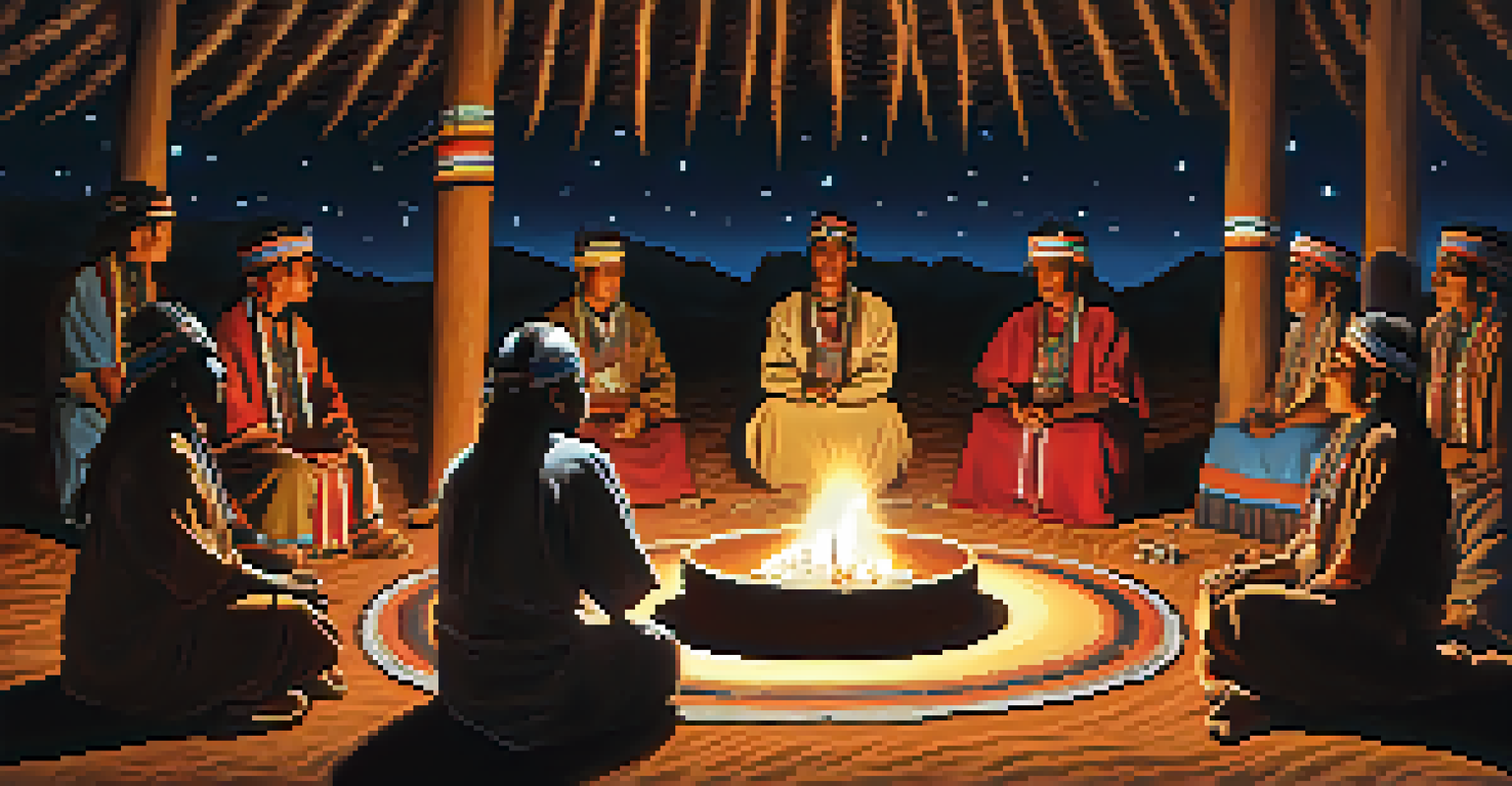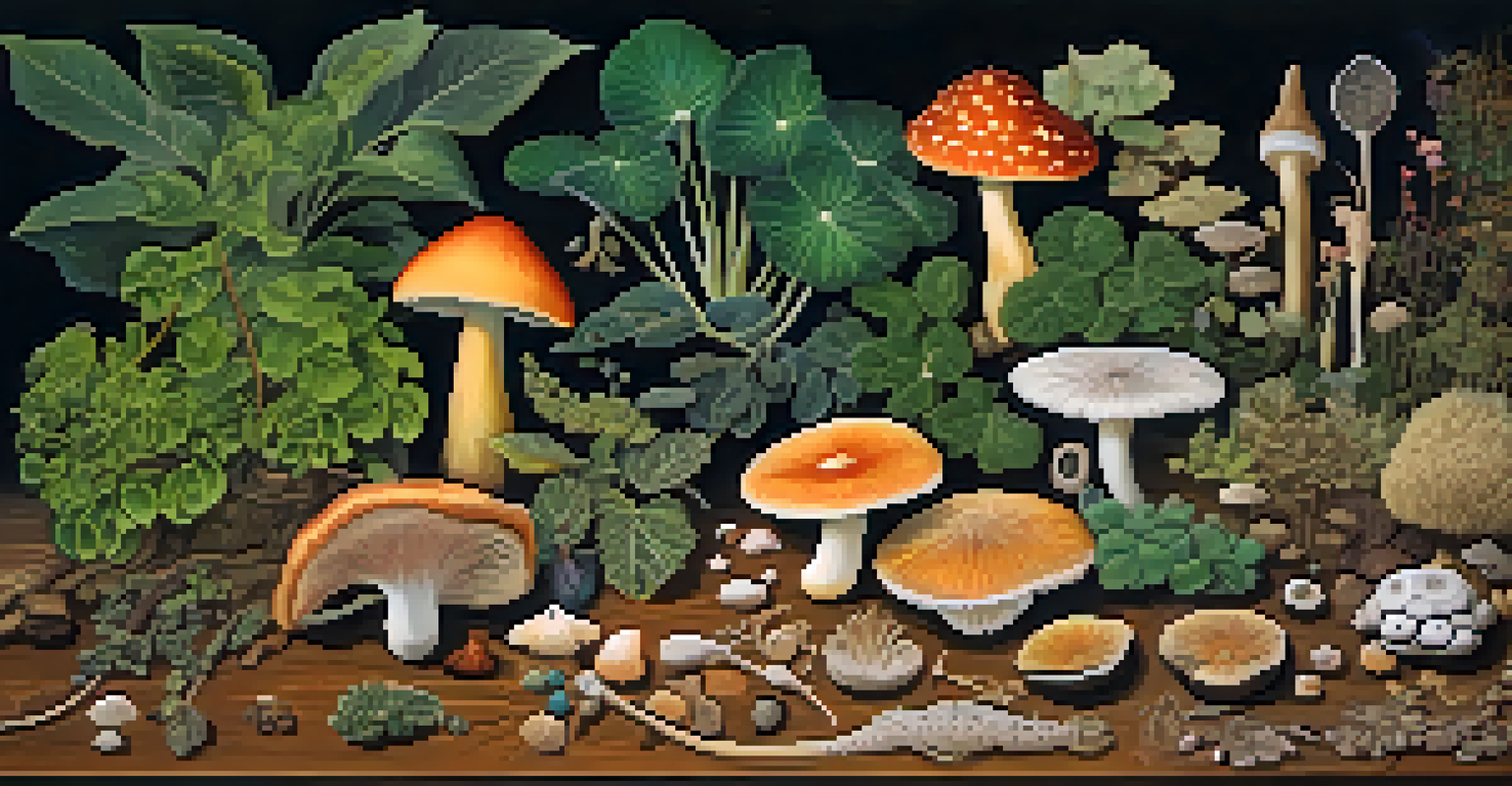Globalization's Impact on Traditional Entheogen Practices

Understanding Entheogens and Their Cultural Significance
Entheogens are substances that induce altered states of consciousness, often used in spiritual or religious contexts. These plants and fungi have been integral to various cultures for centuries, serving as tools for healing, divination, and community bonding. From ayahuasca in the Amazon to peyote among Indigenous tribes in North America, each practice reflects deep-rooted traditions and beliefs.
The plants and fungi we call entheogens have been utilized for centuries by various cultures, serving not only as tools for healing but also as gateways to spiritual realms.
As globalization unfolds, these practices face both opportunities and challenges. On one hand, increased interest from the outside world can promote awareness and appreciation for these cultures. On the other hand, it risks commodifying sacred practices, stripping them of their original meaning and purpose.
Understanding the cultural significance of entheogens is crucial for appreciating their role in traditional societies. This awareness can foster respect and sensitivity, especially as these practices become more visible on the global stage.
Globalization: A Double-Edged Sword for Entheogen Practices
Globalization often brings about a clash of cultures, where traditional practices are exposed to global influences. This can lead to a dilution of original customs as they adapt to new audiences. For example, traditional ceremonies may be altered to cater to tourists seeking a unique experience, which can undermine the authenticity of the practice.

However, globalization can also facilitate cross-cultural exchanges that enrich and revitalize traditional practices. When people from different backgrounds come together, they can share their insights and experiences, potentially leading to a deeper understanding and respect for entheogenic traditions.
Cultural Significance of Entheogens
Entheogens play a vital role in various cultures, serving as tools for healing and spiritual connection.
Thus, while globalization poses threats to the integrity of traditional practices, it can also provide avenues for growth and adaptation. The key lies in balancing the preservation of cultural heritage with the need for evolution in a rapidly changing world.
The Role of Western Interest in Entheogen Practices
The rising interest in entheogens among Western populations has significantly impacted traditional practices. Many individuals seek these substances for personal growth, healing, or spiritual exploration, which can lead to an influx of tourists and seekers in regions where these practices originate. This demand can provide economic benefits to local communities, yet it also raises concerns about exploitation.
When we appropriate sacred practices for our own use, we risk diluting their significance and losing the profound insights they offer.
As Westerners engage with these practices, there's a risk of misinterpretation or appropriation. When outsiders participate in sacred ceremonies without understanding their significance, it can trivialize the experiences of the original practitioners. This highlights the importance of education and respectful engagement with these traditions.
Navigating the complexities of Western interest requires a thoughtful approach. Encouraging respectful participation and emphasizing the importance of cultural context can help mitigate potential harms while still promoting understanding.
Commercialization of Traditional Entheogens
The commercialization of entheogens is a growing trend, especially with the rise of wellness tourism. Retreats offering guided experiences with ayahuasca or psilocybin mushrooms have become increasingly popular, often marketed as pathways to enlightenment or healing. While this can provide financial support to local communities, it raises ethical concerns about the commodification of sacred practices.
With commercialization, there's a risk that the true essence of these traditions is lost. When profit becomes the primary motive, the rituals may be simplified or altered to meet market demands, potentially leading to a superficial understanding of their significance. This can create a disconnect between the seekers and the original cultural context.
Globalization's Mixed Impact
While globalization can dilute traditional practices, it also offers opportunities for cultural exchange and revitalization.
Finding a balance between economic benefits and cultural integrity is essential. Encouraging responsible tourism that respects local traditions can help ensure that entheogenic practices are honored rather than exploited.
Impact of Technology on Entheogen Accessibility
Technology plays a significant role in shaping how entheogenic practices are perceived and accessed globally. The internet has made information about these substances readily available, allowing individuals from all walks of life to learn about their uses and effects. This increased accessibility can empower people to explore these practices but can also lead to misuse or uninformed experimentation.
Moreover, social media platforms have amplified the visibility of traditional ceremonies, drawing attention from those curious about altered states of consciousness. While this can foster interest and dialogue, it can also contribute to cultural appropriation, where the nuances of these practices are overlooked in favor of sensationalism.
As technology continues to evolve, it’s crucial to approach entheogen practices with responsibility and respect. Promoting informed discussions and education around these substances can help safeguard their cultural significance while allowing for thoughtful exploration.
Revival and Preservation of Traditional Practices
In response to the challenges posed by globalization, many communities are actively working to revive and preserve their traditional entheogen practices. This can involve revitalizing ceremonies, educating younger generations, and advocating for the recognition of their cultural heritage. These efforts are essential for maintaining the integrity of their traditions in a rapidly changing world.
Collaborative initiatives often arise, bringing together practitioners, scholars, and advocates to support these preservation efforts. Workshops, cultural exchanges, and educational programs can foster deeper appreciation and understanding of entheogenic traditions, ensuring they are honored and respected.
Ethical Concerns of Commercialization
The rise of wellness tourism raises ethical questions about the commodification of sacred entheogenic practices.
The revival of traditional practices not only benefits the communities involved but also enriches the global tapestry of cultural knowledge. By valuing these ancient practices, we can foster a sense of connection and respect for diverse ways of understanding and experiencing the world.
Looking Ahead: The Future of Entheogen Practices
As globalization continues to shape the landscape of traditional entheogen practices, the future holds both promise and uncertainty. The increasing interest in these substances for therapeutic and spiritual purposes may lead to more widespread acceptance and integration into modern wellness practices. However, this must be approached with caution to avoid the pitfalls of cultural appropriation and misrepresentation.
It's essential for practitioners, seekers, and scholars to engage in ongoing dialogue about the ethical implications of these changes. By prioritizing respect, education, and cultural sensitivity, we can work towards a future where traditional practices are honored and preserved.

Ultimately, the path forward involves collaboration and mutual respect between cultures. By embracing the richness of entheogenic traditions while acknowledging their origins, we can create a more inclusive and understanding global community.